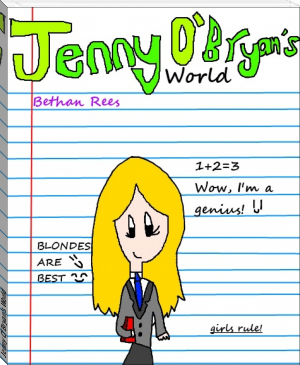The History and Records of the Elephant Club, Doesticks and Underhill [ereader with dictionary .TXT] 📗

- Author: Doesticks and Underhill
Book online «The History and Records of the Elephant Club, Doesticks and Underhill [ereader with dictionary .TXT] 📗». Author Doesticks and Underhill

Dropper and Quackenbush, however, had no fears, but their drafts on the fire, through the hose, were not honored with smoke. They exhausted the atmosphere in their mouths, but get a taste of smoke they could not, and, in despair, Mr. Quackenbush called in the proprietor for an explanation of the mysteries of fumigating à la Turque. In compliance with the request, the gentleman informed the amateur Turks that they must inhale the smoke. Dropper protested that he wouldn't make his lungs a stove-pipe to oblige anybody—even the sultan and his sultanas—and he accordingly dropped the hose, and ordered a chibouk. Quackenbush, however, made the effort, but a spasmodic coughing put an end to further attempts, and the result was that another chibouk was called for. Each member of the club began to feel himself sufficiently etherealized to aspire to a position in a Mahomedan heaven, where he could be surrounded by the spirits of numberless beautiful houris, when the attention of Mr. Spout was attracted to a young gentleman, seated on a divan, in the rear of the apartment.[Pg 69]

He was smoking a ponderous chibouk, and the cloudy volumes sent forth from his mouth hung about his form, quite obscuring him from sight. Occasionally, however, he would stop to breathe, which gave the members of the club an opportunity to survey his appearance. He was a young man of about twenty-two years, small in stature, with a pale, delicate skin, and light hair, plastered down by the barber's skill with exactness. He had no signs of beard or moustache. He was evidently making mighty efforts to become a Turk. He sat on the divan, with[Pg 70] his legs drawn up under him, adopting the Turkish mode of inhaling the smoke, and he followed one inhalation by another with such fearful rapidity that the first impulse of the uninitiated would have been to cry out fire. But he evidently didn't sit easy, for after a few minutes, he pulled his legs out from under him and stretched them out at full length, to get out the wrinkles. The Turkish manner of sitting was, evidently, attended with physical inconveniences, for, after about a dozen experimental efforts, he gave it up, put his heels on the table, and laid himself back against the cushions. Still, however, he continued to smoke unremittingly (as if to make up in that what he lacked in ability to sit in the Turkish posture). But it was soon manifest that the young man was suffering. His face was deathly pale, and, dropping his chibouk, he called out for his oriental host. The gentleman in the red cap appeared, and the sufferer informed him that he "felt so bad," and he placed his hand on his stomach, denoting that as the particular seat of his difficulty. The benevolent Turk suggested exercise out of doors, and, as the elephant hunters were about going out, they offered to accompany him to his home. The offer was accepted, and the youth, sick in the cause of Turkey, left, supported by Dropper and Quackenbush.[Pg 71]
A walk of a few squares relieved the young gentleman of the extremely unpleasant sensations, when he begged leave to express his thanks to the gentlemen for their kindness. He took occasion to inform them that his name was John I. Cake, late a resident of an interior town in Illinois, where his parents now reside. He was, at present, living in New York with an uncle, who was a banker in Wall-street, under whose tuition he was learning rapidly how to make inroads upon the plunder of his neighbors, without being in danger of finding his efforts rewarded with board and lodging at the expense of State. He had been educated at a country college, and knew nothing of city life, except what he had seen in Wall street.
Mr. Spout said that he was very happy to have met him, and inquired whether he would like to have an opportunity of seeing the elephant.
Mr. John I. Cake said that nothing would please him better. Mr. Spout proceeded at once to inform him that the gentlemen who were present were members of an organization gotten up for that express purpose, and which was known among themselves as the Elephant Club; further he said to Mr. Cake, that if he desired to join, they would admi[Pg 72]nister the obligation to him that evening, and initiate him into the order.
Mr. Cake said by all means. At this time the party had reached the front of a church, in the shadow of which they stopped. Mr. Spout, as Higholdboy, announced that the Elephant Club was now organized. "Mr. Cake," said he, "step forward and receive the obligation."
Mr. Cake did step forward with a bold and determined step.
Mr. Spout continued: "Let your arm," said he, "hang in an easy position from the right shoulder. Now let the digits of your other hand point 'over the left.' Now then, Mr. John I. Cake, late of the State of Illinois, but now encircled with, the moral atmosphere of Wall street, you do solemnly swear, by the sacred horn spoons, that you desire to become a member of the Elephant Club, that you are willing, on becoming a member, to do as you please, unless it pleases you to do something else; that you will never kick a big Irishman's dog, unless you think you are smart enough to thrash his master; that you will be just as honest as you think the times will economically allow; that you will, under no circumstances buy and smoke a 'penny grab,' so long as you have philanthropic friends who will give you Havanas.[Pg 73] All of this you solemnly swear, so help you John Rogers."
"Perhaps," was the response of Mr. John I. Cake.
"Having given the correct response," said the Higholdboy, "you are pronounced a member of the Elephant Club, when you shall have duly favored us with the initiative sit down."
"Good!" said Mr. Cake, "where shall it be?"
"Wherever good oysters are to be procured," said Mr. Dropper.
"Here you are, then," remarked Quackenbush, as he pointed to a sign over a subterranean door-way, over which was inscribed the words,
"Here are the spot
Where good oysters is got."
The club descended into the saloon, and Mr. Cake called for six half dozens on the half shell.
Now, be it known to the readers of these records, that Mr. Cake was unacquainted with the perfection to which many departments of manual labor had reached, and being naturally of an inquiring turn of mind, he stayed outside to watch the feats of the young man who brandished the oyster-knife. This gentleman was an adept at his profession. With the most perfect grace of motion, he would lift the[Pg 74] oyster in his left hand, lay its edge gently on a small iron standard, give that edge two delicate raps with the butt of the oyster-knife as a signal to the oyster that its turn had now come, when immediately the shells would open, the upper half would jump off and fall below, and the oyster would smile at the young man as he took the knife, and delicately stroked down its beard. All of this transpired in a very short period of time, which, with the artistic grace displayed by the professor, was sufficient to[Pg 75] astound Mr. Cake. Indeed, he had entirely forgotten his companions in his admiration of conchological anatomy.

The oysters were placed before the gentlemen, and partaken of with a relish. But Mr. Cake had not seen enough to gratify his wishes. He ordered another dose all around, and again took his position outside to watch the operation of divesting the oysters of one half of their natural exterior protection. Without doubt, the young man's merits, at his particular vocation, were great; but Mr. Cake magnified them, in his intense admiration, most alarmingly. To him, it seemed as if each particular oyster was waiting for its turn to come, and only wanted a wink from the young man, when it would jump into his grasp, proud that it was permitted so soon to be sacrificed by such a hand. Mr. Cake was transfixed; he never moved his eyes until the second, third and fourth installment of shell-fish were served up.
Mr. Boggs then spoke about drinks. Johnny protested that he never drank anything that would intoxicate—in fact, he was an uncompromising teetotaller. Still, however, he had no objections to treating the crowd, as that would give him an opportunity to remain a few minutes more with the[Pg 76] object of his admiration. He continued to watch the motions, whilst his friends were doing justice to the spirituous decoctions. At last Mr. Spout told Johnny that it was time to go. Johnny went to the bar, paid the bill, and, as the party regained the street, Johnny Cake said, with a sigh, that he only wished he were an oyster, that he, too, might be the willing victim of that young man's knife. But, inasmuch as he was not, it was his intention to gratify his desire to see the young man's manipulations by coming every night until he was satisfied.
It is a fact which may be asserted, that Mr. Johnny Cake, as the members of the club had now learned to call him, with forty "oysters and the fixens" on board, did not walk with much apparent comfort.
The club stopped to deliberate, but in the midst of their deliberations the City Hall bell sounded, and instantly commenced all that furious uproar peculiar to Gotham at the sound of an alarm of fire. A crowd of screaming men and boys came tearing along, dragging Engine No. 32½, which hung back and jumped about, as if determined not to go at any hazard. About half a block in advance of this crazy throng rushed a frantic man, with a red shirt and a tin trumpet. Each individual yelled as if the gene[Pg 77]ral resurrection were at hand, and he under special obligations to wake up some particular friend. The rheumatic engine held back with all its power, and seemed, for the moment, endowed with a kind of obstinate vitality. Now it threw its wheel round a lamp-post, then it tumbled against the curb-stone, then it ran its tongue into an awning, then affectionately embraced with its projecting arms a crockery-wagon, and finally, with a kind of inanimate dogged determination not to go ahead, in turning a short corner, it leaped triumphantly astride a hydrant, where it stuck. The men tugged, but the engine held fast; the frantic man in the red shirt came tearing back; he had gone far enough ahead to see that 13¼'s boys had got their stream on the fire, and he was furious at the delay. One mighty jerk, and the men and boys were piled in a huge kicking mass on the pavement, which phenomenon was occasioned by the unexpected breaking of the rope. The rope was tied, and by a united effort directed at the wheels, the brakes, the tongue, and every get-at-able point, the machine was again started, protesting, with creaks, and groans, and various portentous rumblings in its inner works, against the roughness of its treatment.
The frantic red-shirt-man howled through his[Pg 78] trumpet that Hose 243/8 was coming. The boys looked back, and Hose 243/8 was coming. Hose 243/8 came alongside. Hose 243/8 tried to go by. Hose 243/8 was evidently striving to get to the fire in advance of her betters, but Hose 243/8 couldn't do it—for, at this interesting juncture, 32½'s fellows waked up to their work, and the race began. Single gentlemen got into door-ways, or crawled under carts; the ladies who were in the street at that time of night disappeared down oyster-cellars; the M.P.s probably went through the coal-holes, for not one was at that instant "visible to the naked eye." Stages, to get out of the way, turned down alleys so narrow that they had to be drawn out backwards; an express-wagon was run into, and wrecked on a pile of bricks; an early milk-cart was left high and dry on a mountain of oyster-shells; a belated hand-cart-man deserted his vehicle in the middle of the street, and it was instantly demolished, while the owner was only preserved from a similar fate by being knocked gently over a picket-fence into an area, where there couldn't anybody get at him. In the height and very fury of the





Comments (0)